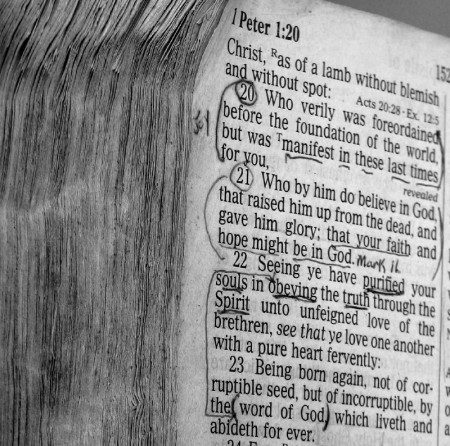Theologians will sometimes describe a “formal” and a “material” principle that beat at the heart of the Protestant Reformation. The “material” principle is, in a sense, the content of the Reformation: its basic teachings and program – and in particular the wonderful message of justification by grace through faith in Jesus Christ. The “formal” principle is a bit harder to describe. It is the authority of the Reformation. It is the how and why the Reformation’s program came into being. It is the Reformation’s motor.

The “formal” principle of the Lutheran reformation is crystal clear. Luther himself insisted: it is precisely the Word of God. Theologians call the principle “sola Scriptura.”
There are, of course, plenty of alternatives. We might say that the “formal principle” of the Roman Catholic tradition is the Word of God – plus the institutions of the Pope and the weight of holy tradition. Our Anglican friends find their “formal principle” in the Word of God – plus consecrated reason. Modern evangelicals may find their “formal principle” in the Word of God – plus some political ideology or social theory. But Lutherans, traditionally, hope to base their life and teaching in the Word of God – plus nothing. “Sola Scriptura.” Scripture alone.
This is the “formal” principle of our little community, too.
We advocate making disciples among all the nations of the world. Why? Because the Word of God commands us. We advocate surrender to the Lordship of Jesus Christ in every area of our lives. Why? Because Christ in his Word invites us. We follow because he beckons. We witness because he leads. Christ in his Word establishes the agenda: not culture, not reason or tradition – not even the dictates or decisions of the church.
The mission of God is not about us, after all. It is not about our own feeling of fairness or compassion or reason, our own sensibilities or consensus or tradition. To suppose so is to confuse the “formal” principle of God’s mission in the world, and to begin at the wrong beginning. We can only learn about God’s agenda for the world through God’s own Holy Word.
Who could know anything about sin and lostness, after all – unless God were to reveal it? Who could know about forgiveness and grace – unless God were to proclaim it? And who could know that fishermen may be called by grace to “fish for men”? Who could know that zealots and tax collectors may become the ambassadors of heaven? Who could know that “five loaves and two small fish” are much in the service of the Savior? History might teach us about Jesus, his life and teachings, his wonderful miracles, the Cross outside Jerusalem, and even the Empty Tomb. But who could know that our Lord lived and died and was raised for us – unless God himself were to reveal the miraculous news? We cannot find our way to the banquet (or ever come to invite others!) unless God’s own Word shows the way.
“Out of the word, as from a spring, flows our entire religion,” explained Martin Luther (What Luther Says, p.1465). This is the “formal” principle and inner motor of Luther’s Reformation – and the motor of our missionary community as well. “God shares with us the good news,” our Mission Handbook affirms, “through the Bible” (¶28). This Book has become our “special treasure” (¶79). We will want to hear it, and learn it, and share it, and live out its good news “at every opportunity” (¶79).
Let the “content” of our missionary community – our “material” principle, if you please, our life and work in the world – always begin here. It turns out that the world does not much need our clever “content,” anyway. It needs a word. It needs encounter with the living God. It needs the extraordinary message of God’s redeeming gospel, by grace through faith in Jesus Christ.
Other posts in this Elements at Our Heart series: